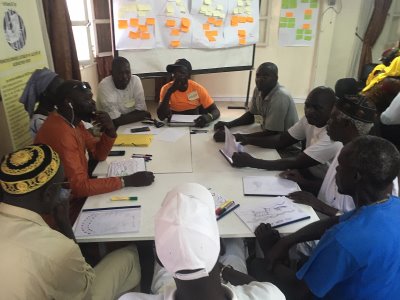The opening session began with a prayer followed by welcome remarks and the self-presentation of the participants. Then representatives of the local and national committees of the initiative presented the concepts underpinning the small-scale fisheries academy in Senegal and the Guidelines for sustainable small-scale fisheries (SSF Guidelines – in FR).
The small-scale fisheries academy (SSF academy) in Senegal is a multi-stakeholder platform for free and respectful exchanges, for the co-learning and co-production of knowledge and innovations aimed at marine protection, the sustainable use of marine and coastal resources and sustainable artisanal fisheries.
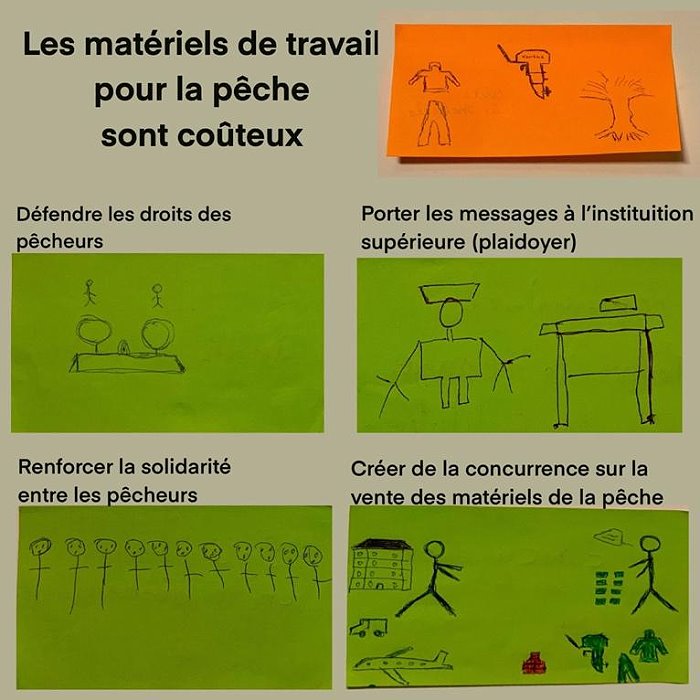
Picture: Heavy use on visualisation tools allows active participation in developing critical analysis and search for solutions of all participants irrespective of their formal educational level.
Subsequently, the participants carried out visualisation and reflection exercises, starting from the drawings and exchange in groups. They began by defining their vision of a happy life built thanks to their socio-economic activity.

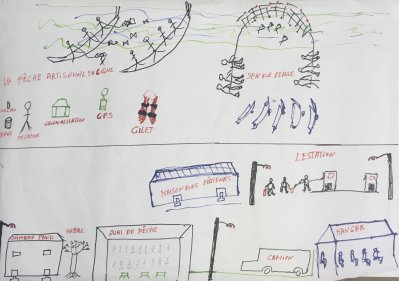
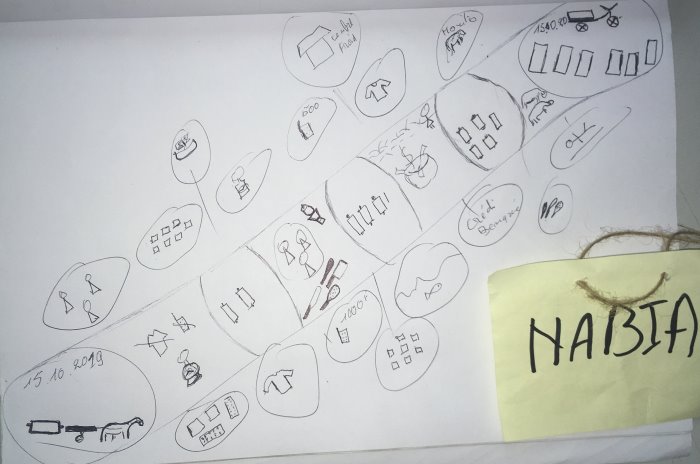
Pictures: Representations of a happy life by fishers (above right) and women fish vendors (above left) and the details of how Nabia (below) is progressing along her one-year plan.
A good example of achievements resulting from using the methods was given by Nabia. Nabia is a micro-fish vendor from Yoff.
She said: “Before, I only marketed a crate of fish a week. During the past three months I stopped buying clothes and wanting a luxury laptop. I reduced my days of expensive internet connection. Instead of six days a week, I connect twice a week. I also decreased the loans. All this together is profitable and helped me to get two crates of fish to market per week. This allowed me to achieve at my goal, set for the first three months in my annual plan. For clothes I bought a boubou up to 30,000 FCFA to go to baptisms, now I save this amount and I wear clothes already sewn. I’m happy and I would like at the end of one year to have six boxes of fish a week and a bike that will make it easier to transport products.”
Afterwards, the participants working along the artisanal fisheries value chain conducted an analysis of their professional activity. Each stakeholder group agreed on the positive effects (yellow) and the challenges (orange) and then identified priority actions (green) to bring about positive change.
On the second day, each person drew up a plan for the one-year period with actions to complete in order to achieve intermediate objectives set for each three-months period. The actions consider the current situation, challenges and opportunities according to their own opinion.

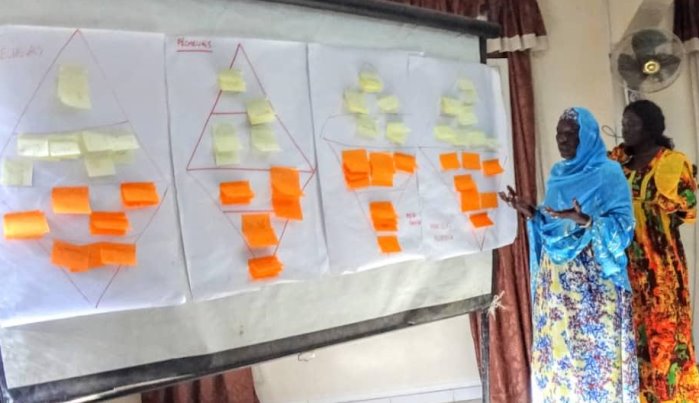
The concept and the basic ideas of the SSF academy in Senegal stem from the need to find solutions to the various challenges that the actors and actresses of the sector have to confront; they do this, for example, through the triangulation and comparison of different perspectives. In doing so, they have taken into consideration the in-depth empirical knowledge of women and men in fisheries, fish processing and marketing, as well as more theoretically supported knowledge by managers, researchers, civil society organisations and still others.
On the third day, the academy hosted Dr. Oumar Diène for an exchange on climate change and its effects on lifestyles in artisanal fisheries.
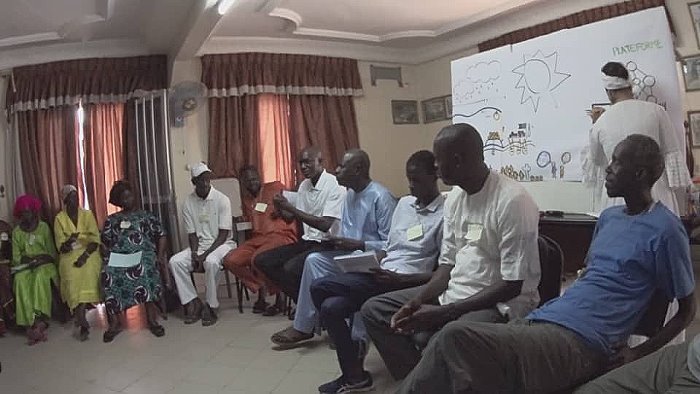
Picture: Dr. Diène (in white shirt, fifth from the right) reports on climate change effects and what’s already being undertaken to adapt in Yoff. Maria Fernanda Arraes Treffner is graphically recording the key points of the conversation with the participants.
The participants identified socio-environmental adversities experienced in recent decades and their perception of the effects on their economic activities, which ware graphically recorded in the drawing below. Among the challenges mentioned by the community were: the increase of the water temperature, the changes in the rainy season, the massive presence of migrants in the area, the increase of the population living in the coastal zone and which is dependent on artisanal fishing, overfishing and degradation of forest resources.
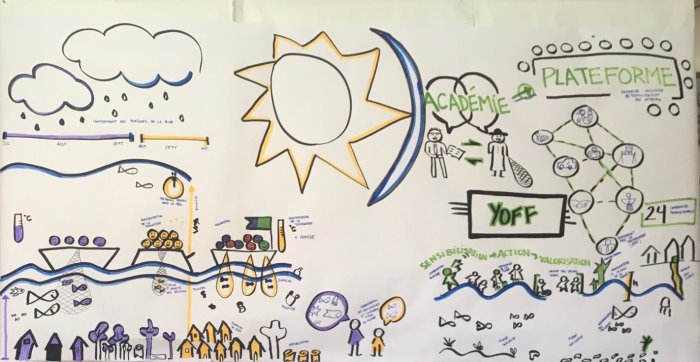
Picture: Among the effects on their way of life, the participants named: the loss of knowledge about the marine species and the sea among the fishermen (young generations and migrants), the need to go further every time for a good catch, the reduction of the quantity and variety of fish, among others.
Then, Dr. Diène, who is a geographer specialising in oceanography and the administrative manager of the local NGO APECSY, shared information about the platform concerned with the environment and management of the living conditions in Yoff.
This is an initiative that brings together 24 socio-professional categories seeking to achieve sustainable development through education and environmental management.
As a final activity of the workshop, participants identified next steps for sharing tools used with family members and community groups.
They also decided to form an office that will work as a local committee of the SSF academy in Yoff to set out a work plan for the year 2020.
A couple of participants from the first test workshop in Hann in June joined this second test workshop in Yoff – hopefully as a way to encourage wider practical solidarity between communities.
The animation team of the workshop was led by Maria Fernanda Arraes Treffner and included, e.g. Mamadou Faye, chair of the local committee in Hann, Khady Mbengue, Mbor Thiaw, Marieme Sod Seck and Mamadou Mbaye, chair of the local committee in Yoff. Aliou Sall, chair of the national committee of the initiative of the SSF academy supported the workshop with inputs about the SSF Guidelines and – as Vice-Chair of Mundus maris – provided key funding. We thank our partner APECSY for kindly providing excellent room facilities.
The report of the training workshop is available here (FR).
